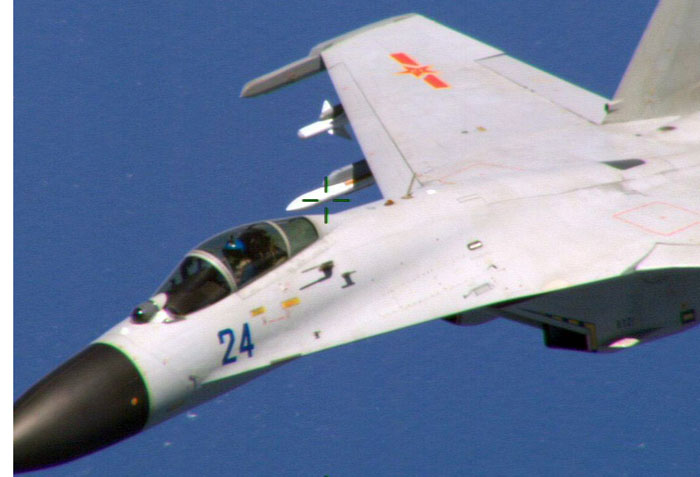This image obtained on Friday, courtesy of the Department of Defence, shows a Chinese fighter jet in a photo taken by a US Navy P-8 crew.
AFP
A Chinese fighter jet flew perilously close to a US military aircraft in international airspace this week in a "very dangerous" incident east of China's Hainan Island, the Pentagon said on Friday.
"On August 19, an armed Chinese fighter jet conducted a dangerous intercept of a US Navy P-8 Poseidon patrol aircraft that was on a routine mission," spokesman Rear Admiral John Kirby told a news conference.
It occurred about 135 miles east of Hainan, he said.
"We have registered our strong concerns to the Chinese about the unsafe and unprofessional intercept, which posed a risk to the safety and the well-being of the air crew, and was inconsistent with customary international law," Kirby said.
The move also undermined efforts to bolster US relations with China's military, he said.
The armed Chinese warplane flew close to the surveillance aircraft three times, flying underneath the American plane, at the P-8's nose and then in parallel with the wingtips, less than 30 feet apart, he said.
In approaching the P-8, the Chinese jet at one point performed a barrel roll, apparently to display its weapons, he said.
"The Chinese jet also passed the nose of the P-8 at 90 degrees with its belly toward the P-8 Poseidon, we believe to make a point of showing its weapons load," he said.
The intercept was "very, very close, very dangerous," Kirby added.
The skies over Hainan Island were the scene of a major international incident in April 2001, when a Chinese fighter jet collided with a US Navy EP-3 spy plane.
The collision left one Chinese pilot dead and forced the American plane to make an emergency landing on Hainan. Chinese authorities initially detained the American crew.
The White House called the jet’s close brush with the US surveillance plane a deeply concerning provocation and said US officials have protested to Beijing.
“We have communicated directly to the Chinese government our objection to this type of action,” Ben Rhodes, deputy White House national security adviser, told reporters.

